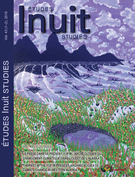
Etudes Inuit Studies
Scope & Guideline
Exploring the Depths of Inuit Knowledge
Introduction
Aims and Scopes
- Community-Based Research:
The journal emphasizes research that involves collaboration with Inuit communities, respecting their knowledge systems and cultural practices. This approach fosters mutual learning and empowers local voices in academic discourse. - Archaeology and Heritage Studies:
A significant focus is on archaeology, particularly community archaeology, which integrates traditional knowledge with scientific methods to uncover and preserve Inuit heritage. - Cultural and Linguistic Studies:
The journal explores the linguistic aspects of Inuit culture, including the role of language in shaping identity and social structures, providing insights into linguistic relativism and cultural transmission. - Social Justice and Indigenous Rights:
Papers often address themes of colonialism, resistance, and social justice, highlighting the historical and ongoing impacts of colonial practices on Inuit communities and their rights. - Education and Youth Engagement:
Research related to education systems, especially in Inuit regions, is prominent, focusing on culturally relevant pedagogies and youth empowerment through traditional knowledge.
Trending and Emerging
- Collaborative and Participatory Approaches:
There is an increasing trend towards collaborative research that actively involves Inuit communities in the research process, fostering partnerships that respect local knowledge and priorities. - Impact of Climate Change:
Recent papers highlight the effects of climate change on Inuit ways of life, emphasizing resilience and adaptation strategies, which are becoming critical areas of focus in the journal. - Digital Storytelling and Heritage Preservation:
The use of digital platforms for preserving Inuit stories and histories is emerging as a significant theme, showcasing innovative methods to engage youth and maintain cultural heritage. - Indigenous Health and Wellbeing:
Research focusing on health services, social services, and community well-being has gained prominence, reflecting a broader interest in the social determinants of health within Inuit populations. - Youth Engagement and Empowerment:
There is a noticeable increase in studies addressing youth engagement initiatives that connect traditional knowledge with contemporary challenges, fostering leadership among young Inuit.
Declining or Waning
- Historical Narratives:
There has been a noticeable decline in papers solely focused on historical narratives without a contemporary context. Recent publications tend to integrate history with current issues, reducing standalone historical analyses. - Non-Indigenous Perspectives:
Papers that primarily present non-Indigenous perspectives on Inuit culture and issues appear to be less frequent, indicating a shift towards more Indigenous-led narratives and research. - Traditional Ecological Knowledge (TEK) in Isolation:
While TEK remains important, there seems to be a waning interest in studies that do not connect traditional ecological practices with modern environmental challenges or community involvement.
Similar Journals
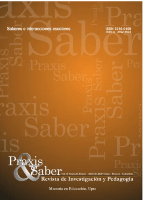
Praxis & Saber
Transforming Teaching Practices with Open Access InsightsPraxis & Saber is a premier open-access journal published by UNIV PEDAGOGICA & TECNOLOGICA COLOMBIA, featuring a commitment to the dissemination of high-quality research across diverse fields related to education, technology, and pedagogy. Since its inception in 2010, this journal has served as a vital platform for scholars, educators, and practitioners to share innovative ideas and empirical studies that advance pedagogical practices in Colombia and beyond. With its accessible format, Praxis & Saber encourages a global exchange of knowledge and insights, crucial for driving educational reforms and enhancing teaching methodologies. Researchers and professionals can benefit from its rich repository of articles that reflect current trends and challenges in the educational landscape. Whether you are looking to publish your findings or seek inspiration for your work, Praxis & Saber stands out as an essential resource in the academic community.
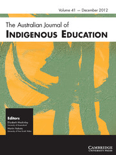
Australian Journal of Indigenous Education
Advancing Knowledge through Indigenous PerspectivesThe Australian Journal of Indigenous Education (ISSN: 1326-0111; E-ISSN: 2049-7784) is a premier platform for scholarly discourse in the fields of anthropology and education, published by the Aboriginal & Torres Strait Islander Studies Unit at the University of Queensland. With an impressive impact factor and recognized as a Q1 journal in Anthropology and Q2 in Education, it serves as a vital resource for researchers, professionals, and students interested in Indigenous education and cultural studies. Since becoming an Open Access journal in 2022, it has enhanced accessibility to critical research, facilitating broader engagement and knowledge sharing within the academic community. Covering a convergence period from 1996 to 2024, the journal is dedicated to advancing understanding and dialogue around Indigenous perspectives and methodologies, thereby contributing significantly to the body of knowledge in both anthropology and education. Its rankings in Scopus further affirm its commitment to excellence, making it an essential resource for those involved in the study and practice of Indigenous education across Australia and beyond.

VOLKSKUNDE
Connecting Scholars through Cultural InquiryVOLKSKUNDE is a distinguished academic journal dedicated to the study of folklore and cultural traditions, published by CENTRUM STUDIE DOCUMENTATIE based in Belgium. With an ISSN of 0042-8523, this journal serves as an essential platform for researchers, scholars, and students interested in the rich tapestry of cultural heritage and ethnographic research. Although currently not available as an open-access publication, VOLKSKUNDE is committed to disseminating high-quality scholarly articles that provide critical insights into the complexities of cultural practices across diverse societies. The journal’s objective is to foster academic discourse and stimulate inquiry into folklore studies, promoting a deeper understanding of cultural dynamics. By engaging with a broad range of topics within its scope, VOLKSKUNDE is an invaluable resource for anyone looking to deepen their knowledge in the field of folkloristics.

Droit et Cultures
Fostering Global Perspectives on Law and CultureDroit et Cultures is a prestigious academic journal published by EDITIONS L HARMATTAN, which has been a vital platform for interdisciplinary exploration in the fields of law, culture, and social sciences. Since its inception, the journal has embraced an Open Access model since 2004, ensuring that a wide audience can engage with and benefit from its scholarly content. Based in the heart of Paris, France, this international journal provides a forum for researchers, professionals, and students to address emerging issues at the intersection of legal frameworks and cultural contexts. Although the specifics regarding its HIndex and Scopus ranks are currently unavailable, the journal's commitment to contributing to academic discourse remains paramount. With a diverse scope that encompasses legal theory, cultural studies, and socio-legal perspectives, Droit et Cultures signifies an essential resource for anyone seeking to deepen their understanding of the dynamic interplay between law and culture.

Archipel-Etudes interdisciplinaires sur le monde insulindien
Illuminating the Intersections of Culture and HistoryArchipel-Etudes interdisciplinaires sur le monde insulindien is a leading scholarly journal published by ASSOC ARCHIPEL, focusing on the interdisciplinary study of the insular world, particularly in the domains of archaeology, history, literature, and cultural studies. With a unique blend of perspectives, this journal aims to disseminate innovative research and foster dialogue among scholars exploring the complexities of insulindian societies and their histories. Recognized for its academic rigor, the journal is indexed in several prestigious categories with varying quartiles, including Q3 rankings in History and Literature and Literary Theory, highlighting its impact in these crucial fields. Despite being a newer entrant since its inception in 2009, the journal has rapidly gained visibility and an engaged readership, contributing to a more profound understanding of island cultures within a global context. Although it does not operate under an Open Access model, its value as a repository of significant academic discourse makes it an essential resource for researchers, professionals, and students interested in the intricate layers of insular studies. Based in Paris, France, this journal continues to support and cultivate scholarly exchange in the multifaceted arena of insulindian research.

ARCHAEOLOGY IN OCEANIA
Delving into the Archaeological Treasures of OceaniaARCHAEOLOGY IN OCEANIA, published by Wiley, is a leading journal that delves into the rich and diverse archaeological landscape of the Pacific region. With a commitment to advancing knowledge in anthropology and archaeology, this esteemed publication has been pivotal in shaping scholarly discussions since its inception in 1966. Spanning generations of research, it has seen converged years of publication from 1966 to 1980 and from 2002 to 2024. With an impressive Scopus ranking placing it in the top quartiles across multiple categories - including Q2 in Anthropology and Q1 in Archeology (arts and humanities) - the journal distinguishes itself as a must-read for researchers, professionals, and students alike. Although it operates on a subscription model, its rigorous peer-reviewed articles and comprehensive studies contribute significantly to understanding the past of Oceania, making it an essential resource for those invested in this vibrant field of study.
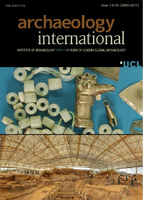
Archaeology International
Exploring the past to illuminate the future of archaeology.Archaeology International is a prestigious open-access journal dedicated to advancing the field of archaeology since its inception in 1997. Published by UCL PRESS, the journal provides a platform for researchers, professionals, and students to disseminate their findings and share innovative ideas in archaeological studies. It features a rich array of articles that capture current trends, methodologies, and debates within the discipline, fostering a collaborative academic environment. Based in London, England, this journal is committed to accessibility and inclusivity, ensuring that valuable research is available to a global audience without subscription barriers. With a focus on interdisciplinary approaches, Archaeology International serves as an essential resource for those interested in the preservation of cultural heritage, and it actively encourages contributions that explore both past civilizations and contemporary archaeological practices.

Periferia
Illuminating pressing issues through rigorous research.Periferia is a prominent open-access journal published by the Universidade do Estado do Rio de Janeiro, dedicated to advancing scholarly dialogue and research in the fields of social sciences, humanities, and cultural studies. Since its inception in 2001, it has served as a vital platform for researchers and academics to disseminate innovative ideas and findings that challenge conventional paradigms. With an E-ISSN of 1984-9540, Periferia ensures that its impactful research is accessible to a global audience, fostering collaboration and knowledge exchange. Although specific metrics like HIndex and Scopus rankings are currently unavailable, the journal is committed to high-quality publication standards that prioritize rigor and relevance in research. Scholars, students, and industry professionals are encouraged to contribute to and engage with the journal, enhancing their understanding of pressing societal issues through robust academic exploration.
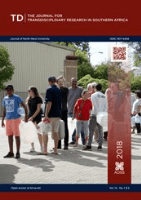
TD-The Journal for Transdisciplinary Research in Southern Africa
Cultivating a vibrant academic community in Southern Africa.TD-The Journal for Transdisciplinary Research in Southern Africa, published by AOSIS, is a pioneering academic journal dedicated to promoting interdisciplinary research across various fields in the Southern African region. With an Open Access model established in 2005, this journal ensures that valuable research is accessible to a wide audience, enhancing collaboration and knowledge sharing among researchers, professionals, and students. The journal’s commitment to transdisciplinary approaches reflects its objective to bridge the gap between theory and practice, fostering innovative solutions to complex societal challenges. Positioned as a vital resource in the academic community, TD-Journal encourages submissions that contribute to academic excellence and impactful research within Southern Africa and beyond. As a medium for fostering scholarly dialogue, it aims to inspire future generations of researchers to engage thoughtfully with pressing global issues.
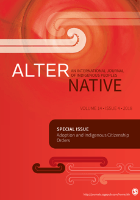
Alternative-An International Journal of Indigenous Peoples
Connecting Scholars to the Heart of Indigenous StudiesAlternative: An International Journal of Indigenous Peoples is a leading academic journal published by SAGE Publications Ltd that focuses on the complexities, narratives, and contemporary issues surrounding Indigenous communities globally. With an impressive Q1 ranking in Anthropology, Cultural Studies, and History, this journal stands at the forefront of interdisciplinary research, making significant contributions to understanding Indigenous peoples’ rights, cultural heritage, and social justice. Spanning years from 2014 to 2024, it serves as a vital platform for researchers, professionals, and students engaged in discussions and studies related to Indigenous knowledge systems and cultural dynamics. The journal operates under rigorous peer-review standards, ensuring high-quality scholarly articles that resonate within the academic community. Although it currently does not offer open access, the valuable insights and research findings presented within its pages are indispensable for anyone dedicated to advancing the field of Indigenous studies.